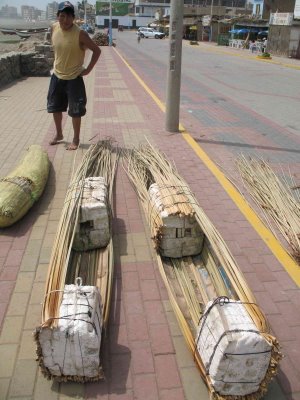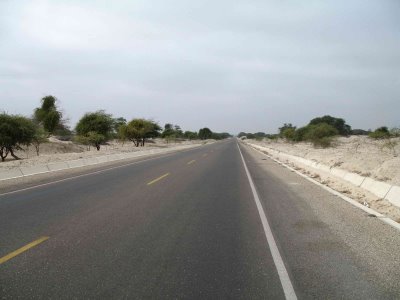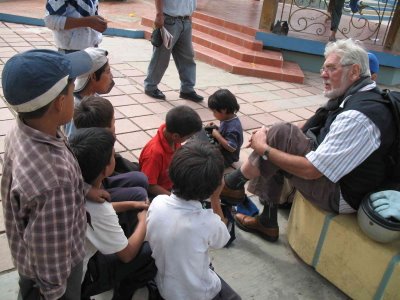septuagenarian odyssies - US/Mexican border to Tierra del Fuego, Tierra del Fuego to New York, long ride round India
Wednesday, September 06, 2006
GOD´S RUBBLE
TUESDAY, SEPTEMBER 5
Ming wishes to discover whether Peru’s uplands are as desecrated as the littoral. We turn inland through hills that resemble large heaps of builder’s rubble – not a good beginning. God continues to have a bad hair day.
MORE GARBAGE
TUESDAY, SEPTEMBER 5
The road south from Chichalaya runs across true sand desert. Large road signs announce zones of dunes. The dunes are larger than the signs and announce themselves. Signs should announce the desert as a vast garbage dump. Not all garbage is dumped in the desert. Many a load is simply dumped on the hard shoulder of the highway, nice roadworthy garbage: broken bottles, cans…
We pass an encampment of garbage pickers. Some have built small huts of adobe. Others have erected tents of discarded black plastic sheet - imagine the heat. Three men pick through a fresh pile. Watchful vultures perch on a broken trailer. Cacti are Nature’s only representatives. The cacti stand on the ridge above the desert and hold their arms aloft in despair. Perhaps Peru’s politicians are ashamed.
The road south from Chichalaya runs across true sand desert. Large road signs announce zones of dunes. The dunes are larger than the signs and announce themselves. Signs should announce the desert as a vast garbage dump. Not all garbage is dumped in the desert. Many a load is simply dumped on the hard shoulder of the highway, nice roadworthy garbage: broken bottles, cans…
We pass an encampment of garbage pickers. Some have built small huts of adobe. Others have erected tents of discarded black plastic sheet - imagine the heat. Three men pick through a fresh pile. Watchful vultures perch on a broken trailer. Cacti are Nature’s only representatives. The cacti stand on the ridge above the desert and hold their arms aloft in despair. Perhaps Peru’s politicians are ashamed.
SHRIMP & CRAB


MONDAY, SEPTEMBER 4
We did the pyramids. Now for the beach. I take a short cut down a dirt track beside an irrigation ditch. The track ends at a five acre garbage dump. A small upmarket resort sits right up against the dump. We drive through the resort to a parking lot on the sea front. A dozen fish restaurants face the sea. Monday and we are the only visitors. Women demand that we give them our custom. We stroll first, inspecting the reed boats the fishermen use. The reeds come wrapped round a chunk of balsa. A few fishermen are paddling out through the surf; a few surfers are riding the surf back in. The wind is chill. We eat shrimp ceviche, perfect, and crab cooked in a tomato, garlic and onion sauce. Ming drinks orange juice. I have a big bottle of beer. The bill comes to $15. The manageress at our hotel earns $150 a month. She works a twelve-hour day. She lives with her mother and her grandmother. She wants to escape to a job in Spain. She can’t. Her mother and grandmother need her.
SLAVE LABOUR
MONDAY, SEPTEMBER 4
We are staying at a great $10 hotel a little out from the centre of Chichalaya, Hospedaje San Eduardo on the extension of 7 Jenero. Water is hot, the beds are new, we have tables in our respective windows at which to work. Good tourists, we ride 45 Ks to inspect the pyramids at Tucume. The pyramids are vast and built of adobe bricks. Ming believes that the king proved his divinity by building mountains. I have a different theory. Adobe is made of clay bound with rice straw. Rice straw was the garbage of the period. The Kings were attempting a clean-up program.
Ming climbs a God-made hill to look down on the pyramids. I will look at the photographs. Meanwhile I sit with three students in the site museum’s open-air cafeteria. The cafeteria serves typical food of the period and maize beer. I refrain. The students eat goat. They tell me they find the site magical (or have been told to find the site magical). Their professor tells them that without slaves there would be no monuments. I am delighted by this splendid excuse for slavery. Perhaps the kings in their divinity foresaw Peru’s tourist industry and way back in the first millennium were setting their slaves to work for Peru’s future.
We are staying at a great $10 hotel a little out from the centre of Chichalaya, Hospedaje San Eduardo on the extension of 7 Jenero. Water is hot, the beds are new, we have tables in our respective windows at which to work. Good tourists, we ride 45 Ks to inspect the pyramids at Tucume. The pyramids are vast and built of adobe bricks. Ming believes that the king proved his divinity by building mountains. I have a different theory. Adobe is made of clay bound with rice straw. Rice straw was the garbage of the period. The Kings were attempting a clean-up program.
Ming climbs a God-made hill to look down on the pyramids. I will look at the photographs. Meanwhile I sit with three students in the site museum’s open-air cafeteria. The cafeteria serves typical food of the period and maize beer. I refrain. The students eat goat. They tell me they find the site magical (or have been told to find the site magical). Their professor tells them that without slaves there would be no monuments. I am delighted by this splendid excuse for slavery. Perhaps the kings in their divinity foresaw Peru’s tourist industry and way back in the first millennium were setting their slaves to work for Peru’s future.
CHAOS
MONDAY, SEPTEMBER 4
The Royal Horse Artillery mount displays at the Royal Tournament. Teams of horses dragging guns and ammunition weave between each other at a full gallop. Chichalaya traffic is similar. No one halts at an intersection, red lights are for chickens. Fortunately the vehicles are mostly slow and relatively harmless: a mix of yellow Daewood Tiki taxis the size of a fairground bumper car and 100 cc motorbike rickshaws. The Daewood Tikis are manufactured in Korea. Import tax on used vehicles is lower than on the new so all Tikis are pre-used or, as a driver told me, almost new. I imagine an industry in Korea: drivers collecting new Tikis from the factory and putting on the necessary mileage to pass Peruvian Customs. A great job for students…
The Royal Horse Artillery mount displays at the Royal Tournament. Teams of horses dragging guns and ammunition weave between each other at a full gallop. Chichalaya traffic is similar. No one halts at an intersection, red lights are for chickens. Fortunately the vehicles are mostly slow and relatively harmless: a mix of yellow Daewood Tiki taxis the size of a fairground bumper car and 100 cc motorbike rickshaws. The Daewood Tikis are manufactured in Korea. Import tax on used vehicles is lower than on the new so all Tikis are pre-used or, as a driver told me, almost new. I imagine an industry in Korea: drivers collecting new Tikis from the factory and putting on the necessary mileage to pass Peruvian Customs. A great job for students…
DESERT

SUNDAY, SEPTEMBER 3
Chichlaya is 264 Ks south across the desert from Pirua. For the first fifty Ks it is a desert of thorn trees. This is Peru and the trees are decorated with plastic bags and plastic sheeting blown by the wind off the heaps of garbage dumped all along the road edge. The road is straight bar a few gentle curves. White markers register the distance from Lima. A shrine at K931 is in memory of Riki. Was he driving? Did he lose control? Fall asleep? Did a tyre explode?
And what did for Tony Ramirez at K909?
The desert is full of mysteries.
Why did someone elect the shade beneath a particular tree as home for his nine beehives? The tree is no different from its neighbours. Tracks come from nowhere and lead across the desert to nowhere. A hut stands all alone sixty yards in from the road. Why sixty? Why not a hundred - or fifty yards further south or north? Everything strikes me as haphazard.
The greatest mystery is why people live here.
They live in low huts built of adobe brick. A fence of sticks offers minimal privacy and protects a yard against the wind and sand. The sand, the huts, the thorn trees are all familiar to me. This could be Somalia or the Ogaden (see www.simongandolfi.com). Only the game is missing and the camels.
I note small efforts at humanising existence: a sand football pitch, the net missing from the goals and the arms broken, an adobe church. Many huts are abandoned, stripped of their roofs. Other huts, exactly similar, are under construction.
Two women spur their donkeys across the road. The women are muffled against the wind. One carries a baby. A party of three, mother, father, early teenager, plod across a clearing. Each is burdened with firewood. How far have they carried their loads? How far will they travel?
Ming and I zip by on our bikes. We come from a different planet. We possess untold riches - not of money – the riches of escape artists, immense freedom of choice. We are concerned as to which hotel we should stay at in Chichalaya.
Tuesday, September 05, 2006
WET PUTRID FISH
SATURDAY, SEPTEMBER 1
When officials in a country keen on tourism warn you to avoid a place, avoid it.
Ming and I avoided Sullana – though not entirely. The highway south forks left on Sullana’s outskirts. Hence my knowledge of the city…
Sullana is interesting, not only for its citizens’ propensity for robbing tourists: Sullana has discovered a method of counteracting global warming. The citizens spread plastic garbage across the country. The garbage helps retain the soil’s humidity and reflects the heat back up at the sun. The city saves on garbage disposal and the world profits from lack of the pollution that garbage trucks cause. The sole disadvantage to this system is the stink. The surrounds of Sullana stink of wet putrid fish.
When officials in a country keen on tourism warn you to avoid a place, avoid it.
Ming and I avoided Sullana – though not entirely. The highway south forks left on Sullana’s outskirts. Hence my knowledge of the city…
Sullana is interesting, not only for its citizens’ propensity for robbing tourists: Sullana has discovered a method of counteracting global warming. The citizens spread plastic garbage across the country. The garbage helps retain the soil’s humidity and reflects the heat back up at the sun. The city saves on garbage disposal and the world profits from lack of the pollution that garbage trucks cause. The sole disadvantage to this system is the stink. The surrounds of Sullana stink of wet putrid fish.
PERU
SATURDAY, SEPTEMBER 1
The Peruvian Customs inspector was new to the job. This was his first shift. Ming and I were his first bikers. He said, “Look, everything will be easy just so long as you don’t hurry me.”
Some writers of guidebooks and of Blogs would have recognised this as the opening to a demand for cash payment.
I presumed he was seeking compassion. He was addressing the right man. I panic at sight of a form. A whole heap and I flee.
The Inspector sat at a table beside a uniformed customs officer. The Uniform was neat and wore a polished pistol with polished bullets in the holster. He had worked this beat for a while, sitting beside previous inspectors. However he hadn’t watched too closely and was less help than wet bread. We finally got the paperwork done. Success was accompanied by many sighs of relief and much shaking of hands and wishes of good luck. Ming and I left the bikes at the office and crossed the road for a juice – freshly squeezed oranges, delicious.
The Inspector called us back. He was suffering doubts. A feeling nagged that we were short a document. If we would wait a short while, the Inspector running the next shift would arrive - no more than half-an-hour.
The Uniform thought this a great waste of everyone’s time.
The Inspector enquired when the Uniform had last seen a foreign biker through.
The Uniform was unable to recall.
Ming and I sat.
The Inspector talked on the radio.
The Radio told him not to worry.
The Inspector is a worrier (as am I).
Why do people tell worriers not to worry?
And the Inspector was correct. Delving through back files, he discovered a biker’s papers. We required a customs permit to leave Peru with our bikes. The Inspector found the permits, filled in our details, stamped and signed them and we were on our way – except for one final piece of advice: “Be careful. Don’t ride through Sullana. In Sullana you will get robbed. Lots of tourists are robbed.”
THANK YOU, ECUADOR
SATURDAY, SEPTEMBER 1
I shake hands and thank the Ecuadorian customs and immigration officials. Ecuador has been a pleasure. It is the cleanest country I have yet ridden through; the people are open and friendly; much of the poverty is hidden and I never felt even remotely at danger or under threat. For caviar, add the best museum (Central Bank) and the chapel of the Rosary, Santo Domingo – both in Quito. And, of course, there are hedges and fells and snow on the peaks and proper, cone-shaped volcanoes. Yes, I’d come back…
I shake hands and thank the Ecuadorian customs and immigration officials. Ecuador has been a pleasure. It is the cleanest country I have yet ridden through; the people are open and friendly; much of the poverty is hidden and I never felt even remotely at danger or under threat. For caviar, add the best museum (Central Bank) and the chapel of the Rosary, Santo Domingo – both in Quito. And, of course, there are hedges and fells and snow on the peaks and proper, cone-shaped volcanoes. Yes, I’d come back…
DANGEROUS

SATURDAY, SEPTEMBER 1
The direct road south from Catamayo to the Peruvian border passes though Carlamanga, a small pleasant town where we breakfasted for a dollar each at a small café on the central square. The altitude is a mere six thousand feet and I sat in the square after breakfast and enjoyed the sun for the first time since leaving Cartagena. A gang of miniature shoeshine terrorists surrounded me. I picked the first and had my good Church’s shoes polished and discussed life and the importance of education with the kids while Ming took photographs. Beyond Catamayo, the road climbs steeply through mountains to a summit at 8,600 feet.
The mountains are near desert; the soil is pale yellow and powdery. This powdery sand coats the road surface at the corners. A biker would be in trouble if he took a corner too fast and had to brake. On some corners the outer lane has slipped down the mountain. At other corners, the mountain has slipped and blocked the inner lane. The drop is forever. Meeting a truck is for serious adrenaline addicts. The Honda is light and manoeuvrable. I would hate to do the climb on a big road cruiser.
TOP RESORT
FRIDAY, AUGUST 31
We stayed last night outside Catamayo at a nine-dollar-a-night resort hotel up a dirt track. The rooms looked out onto a narrow roofless corridor that shared odours with an over-watered mushroom tunnel. We both got eaten by mosquitoes. The pool was clean. I swam. The water was less cold once you were in a while. Ming didn’t swim. People raised in Indonesia don’t do less cold. They do warm or they don’t do.
We stayed last night outside Catamayo at a nine-dollar-a-night resort hotel up a dirt track. The rooms looked out onto a narrow roofless corridor that shared odours with an over-watered mushroom tunnel. We both got eaten by mosquitoes. The pool was clean. I swam. The water was less cold once you were in a while. Ming didn’t swim. People raised in Indonesia don’t do less cold. They do warm or they don’t do.
Subscribe to:
Comments (Atom)